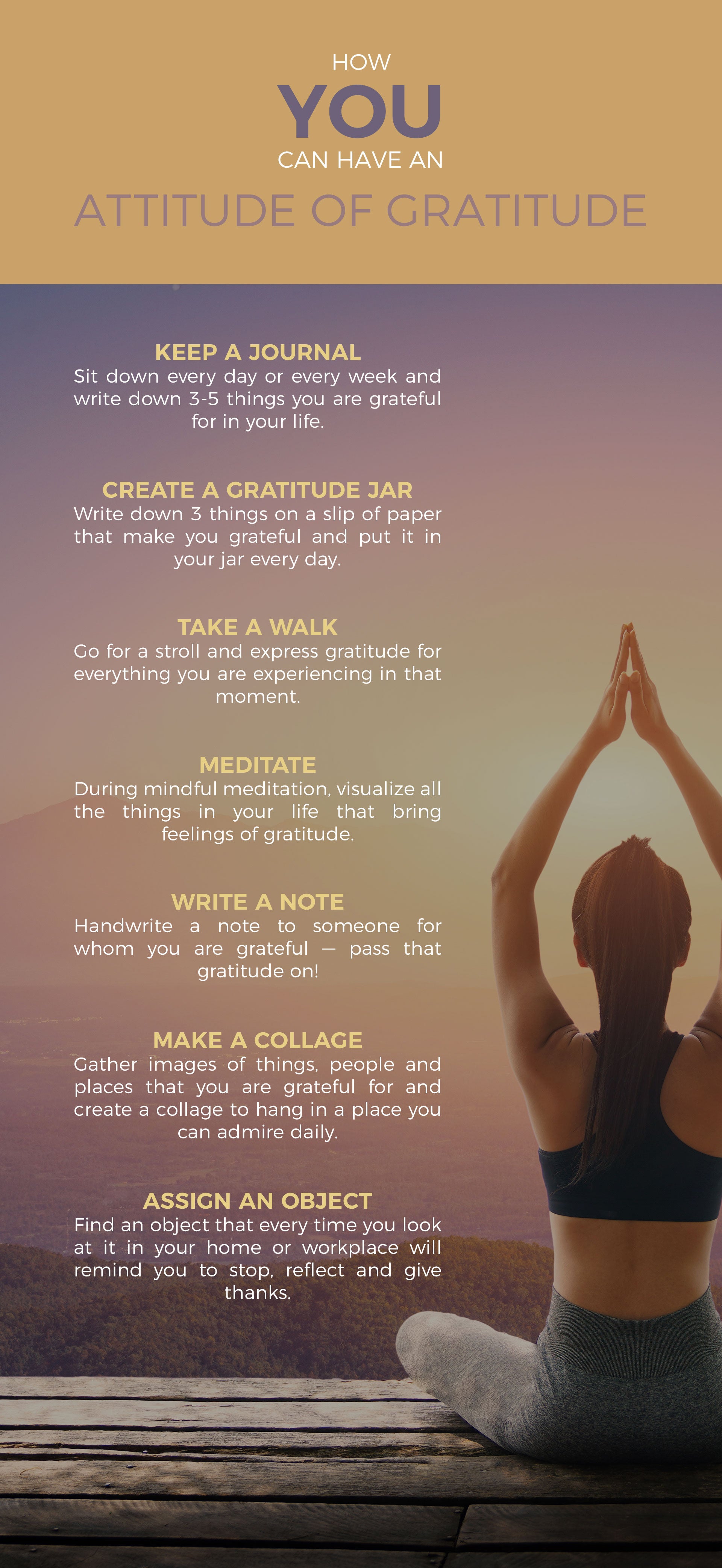How an Attitude of Gratitude Affects Your Emotional and Physical Health
 By: by Amino Science
By: by Amino Science

Gratitude is an emotion we feel when we receive something good unexpectedly or take time to recognize the blessings in our lives. It can make us happier, improve our relationships, and help us navigate trying times with more resilience. But could the benefits of having an attitude of gratitude go beyond that? Is practicing gratefulness good for our health too? Research shows gratitude is strongly related to well-being and has lasting positive effects on our emotional and physical health.
What Is Gratitude?
“Gratitude can transform common days into thanksgiving, turn routine jobs into joy, and change ordinary opportunities into blessings.” — William Arthur Ward
Gratitude is a combination of two qualities: the appreciation and recognition that something is valuable to you. First, we affirm there are good things, gifts, and benefits in the world. Second, we look through the lens of gratitude and recognize that there are sources of goodness in our lives outside of ourselves. We acknowledge the positive things that come our way, even when we are not actively seeking them.
In digging into the word itself, grata or gratia is the Latin word for a given gift. Derived from the same root, grace is a word meaning giving an unearned gift. We may experience a feeling of gratitude at unprompted times, but we can also choose to welcome gratitude into our lives. It’s more than an emotion; it is being mindful of the people and things in your life and deeply appreciating their presence and support. When this becomes regular practice, you can’t help but lead a more positive, fulfilling life.
Benefits of Gratitude
Science and psychology have not always recognized the role gratitude plays in our happiness levels and overall emotional health, even though certain philosophers recognized its significance. They believed gratitude was crucially important to a successful civilization and played an important role in daily life. As Robert A. Emmons, Ph.D., a leading gratitude researcher, stated, “From ancient religious scriptures through modern social science research, gratitude has advanced as a desirable human characteristic with the capacity for making life better for oneself and for others.”
Emotional Health Benefits of Gratitude
With gratitude, we acknowledge the goodness in our lives, which helps us connect to something larger than ourselves as individuals—whether to other people, our loved ones, nature, or a higher power such as God, spirit, or the universe. Many people experience emotional benefits of gratitude, such as numerous negative emotions being reduced, including envy, resentment, frustration, and regret.
Robert A. Emmons has conducted a great deal of research on emotional psychology and has examined the connection between well-being and gratitude. He found that adopting an attitude of gratitude reduces depression, improves relationships, and generally helps people feel happier.
Other studies have shown that grateful people are more empathetic and less aggressive, and that a grateful heart is a more peaceful heart. The very nature of gratitude requires expanding your focus outward, and when you express appreciation for the blessings in your own life, you are more likely to help others and extend those joyful feelings.
When it comes to self-esteem, being grateful lessens the habit of comparison and allows you to celebrate the talents and accomplishments of others. You are able to focus on how your life is supported by others, permitting you to feel more secure, and you are less likely to seek material goods to strengthen your self-image.
Gratitude also builds mental strength and helps you overcome disappointment, mistakes, and trauma with more resilience because you focus on the positives and recognize what you are thankful for, even when faced with setbacks. Pondering the circumstances in one’s life for which one is grateful appears to be a beneficial way of coping with both acute and chronic stressful events.
A sense of gratitude also makes us nicer, more sociable, and more optimistic human beings. As a result, it helps us make friends, deepens our existing relationships, and strengthens our marriage and family bonds. Having meaningful connections improves your emotional health, which, in turn, attracts more positive influences and people to your life, because when you’re happy, happy people want to be around you.
Physical Health Benefits of Gratitude
In recent years, science has explored the impact and health benefits of gratitude on physical well-being, sleep patterns, ailments, and more. Research on the relationship between gratitude and physical health is still developing, but studies so far suggest there may be a connection.
A study reported that people who are grateful and appreciate the importance of this value in their lives felt physically healthier and did not complain of as many aches and pains. Those who regularly express gratitude take better care of their health, exercise more often, and visit their doctors more regularly. All of these factors may likely tie to longer longevity and overall improved physical health.
In another study, more grateful participants reported fewer health problems, such as headaches, gastrointestinal problems, and respiratory infections.
Grateful people also appear to have stronger immune systems, lower blood pressure, and get longer, more restful sleep. Since there is a strong link between emotional and physical health, when we feel better mentally, we simultaneously boost our physical well-being. One big question that is being further explored is whether gratitude causes good health or whether good health causes gratitude. While it most likely flows both ways, practicing gratefulness can help change lives for the better.
How to Cultivate an Attitude of Gratitude
Gratitude isn’t just for Thanksgiving, but looking at the cup as half-full and celebrating the positives does take practice for some of us. Giving thanks and expressing appreciation for the gifts in life is a natural human response, but in a fast-paced world where there is often a constant pursuit of gratification, gratitude often falls to the bottom of the list.
If it’s not your typical disposition, is it possible to count your blessings instead of your burdens? Absolutely. As with anything, cultivating an attitude of gratitude takes repetition and commitment, but adopting gratitude exercises into your daily life can provide substantial health benefits.
"In our daily lives, we must see that it is not happiness that makes us grateful, but the gratefulness that makes us happy.” — Albert Clarke
Grateful living is supported by daily practices, tools, habits of mind, and behaviors that can be applied to many aspects of our lives. Even while dodging curveballs, when we approach life with gratitude and an open heart, we are better able to view challenges as opportunities that may just better our lives. There are infinite ways to show our gratitude to others and ourselves. Here are some proven ways to enhance your appreciation and gain a thankful attitude.
Keep a Journal
One of the easiest exercises is keeping a gratitude journal. While it’s a simple practice, it has extraordinary results. You can sit down every day, every week, or whenever you feel the need, and write down three to five things you are especially grateful for. Taking a moment out of your day to focus on all that brings you happiness, peace, and satisfaction will raise your spirits and can easily transform a negative attitude into a positive one. Many people find journaling especially beneficial before bed as it helps to put you in a positive state of mind before heading off to sleep.
Create a Gratitude Jar
A great activity to do with children, creating a gratitude jar is a fun way to celebrate the good in your life, from the big things to the small things. Whether it is a great cup of coffee, a devoted friend, or sharing a meal with your family, write down three things on a slip of paper that make you grateful and put it in your jar every day. Think of it as thank-you notes to the universe. You will be able to look back at your collection and be reminded of the many blessings in your life and receive a quick pick-me-up on the days you’re feeling down.
Take a Walk
Head outside for a gratitude walk. Whether it’s down the street, in a park, or around your own backyard, allow yourself to clear your thoughts and mindfully focus on what you appreciate about your life. You can also take in what is around you; the colors of the trees, the songs of the birds, the smell of the air. Express gratitude for everything you are experiencing in that very moment. Walking is therapeutic in itself, and coupled with a grateful state of mind, you are bound to come back feeling refreshed and energized.
Meditate
Combining mindful meditation with a gratitude exercise gives you a double dose of optimism and a mental health boost. Gratitude meditation is unique in that you focus on the people, things, and situations in your life that you are thankful for and bring you happiness, instead of paying attention to your breath. Spend time taking stock of all you are grateful for and embracing the feelings that recognition evokes.
Write a Note
There’s nothing better than sharing your gratitude with others. Handwriting a note to someone for whom you are grateful not only fosters cheerful feelings in you, but also touches another person’s life and passes that positivity on. You can even think outside your normal list of close family and friends; include your mail person, a friendly face at the supermarket, or a child’s teacher. You never know what a simple gesture can do in someone’s life or how it may inspire that goodwill to be passed on.
Make a Collage
Time to break out the scissors and glue. Gather images or photos of the things, people, and places that you are grateful for and create a collage that you can look at every day to be reminded of what makes you smile. If digital is more your speed, there are many online resources that allow you to create a collage that can be printed or applied as your desktop background. You will probably discover as the collage comes together that there is a great deal in your life to appreciate.
Assign an Object
Sometimes we need to be reminded during our busy days to pause and practice our gratitude exercise. Find an object that every time you look at it in your home or workplace will prompt you to stop and reflect on what you are grateful for. It could be a rock, a bracelet, a picture, or an inspirational quote. No matter what you choose, it will be a helpful reminder to express your gratitude and can inspire you to de-stress and recharge.
The science of gratitude is still young, but considerable progress has already been made in understanding how gratitude encourages better emotional and physical health and creates a happier you. Even if you currently struggle with adopting gratitude into your life, you can hone this skill through practice, repetition, and positive expectations. With every step, all you put in will come back to you tenfold and you will find yourself truly appreciating and celebrating life.



 833-264-6620
833-264-6620



















